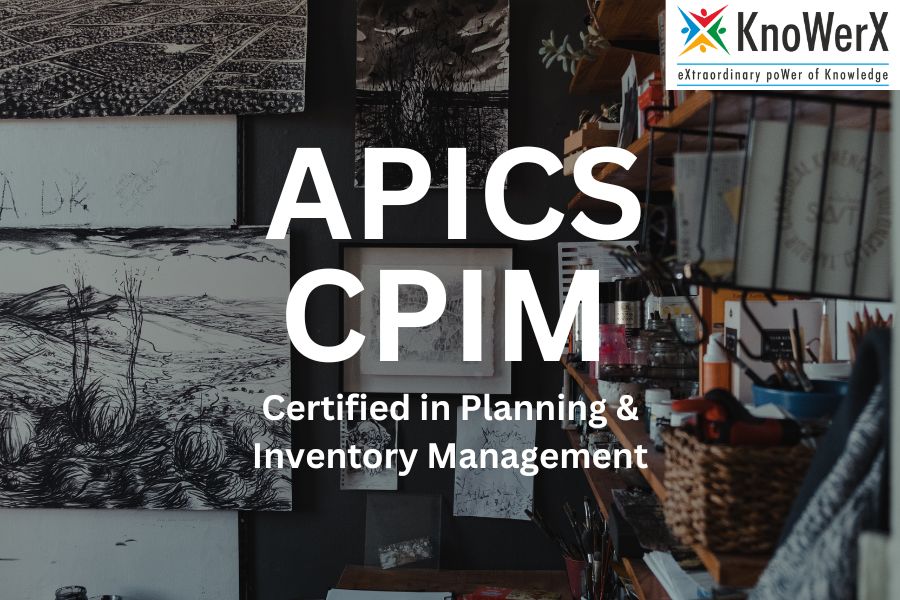APICS CPIM (Certified in Planning & Inventory Management)

APICS CPIM (Certified in Planning & Inventory Management): A Comprehensive Guide APICS CPIM (Certified in Planning & Inventory Management) certification is highly respected in the world of supply chain management. It’s recognized globally for its thorough coverage and relevance to the industry. This article aims to give you a clear understanding of APICS CPIM, covering its importance, benefits, who can apply, what’s required, job opportunities, how long it takes to prepare, how tough the exam is, and the cost, especially in India. Let’s start with the big picture. APICS CPIM certification is a significant achievement for professionals aiming to succeed in the fast-paced world of supply chain operations. Throughout this article, we’ll delve into the details, uncovering why it’s so valuable in today’s competitive job market. By the end, you’ll have a deep understanding of APICS CPIM, helping you decide if it’s the right step for your career in the supply chain industry. What Is APICS CPIM? APICS CPIM, which stands for Certified in Planning & Inventory Management, is a certification designed to help people become experts in managing planning and inventory within supply chains. It’s like a guidebook that gives professionals the essential knowledge and skills they need to excel in their roles in the ever-changing world of supply chain operations. This certification covers a wide range of important topics, like keeping track of inventory, planning production strategically, and making accurate forecasts. By focusing on these key areas, individuals working towards APICS CPIM certification can improve how they work, making them more effective and efficient within their organizations. So, APICS CPIM isn’t just a certification. It’s a journey that helps people become better at managing supply chains, ultimately leading to operational excellence. APICS CPIM Certification Benefits APICS CPIM certification has lots of perks. It can open up better job opportunities, help you earn more money, and make you better at your job. Plus, it shows you’re serious about learning and growing in your career. When you’re certified, you stand out to employers. They appreciate the skills and knowledge that come with the certification, so they’re more likely to hire you. This means you have an edge over others when applying for jobs. Getting certified also proves you know your stuff when it comes to planning and managing inventory. It shows you’ve put in the effort to understand the important parts of supply chain management. This makes employers and your colleagues trust you more. APICS CPIM Eligibility To qualify for APICS CPIM certification, you need to meet certain criteria set by APICS. This includes having the right education and work experience in supply chain management or related areas. Normally, you’ll need at least a bachelor’s degree or its equivalent, along with at least two years of relevant work experience. APICS CPIM certification is made for people at different points in their careers, whether you’re just starting out or you’ve been in the industry for a while. By setting clear eligibility standards, APICS ensures that candidates have the necessary background and experience to do well in the certification process and in their roles after getting certified. APICS CPIM Requirements To obtain the APICS CPIM 8.0 certification, candidates must fulfill certain requirements: Eligibility: There are no specific eligibility requirements to register for the CPIM exam. However, candidates should have a basic understanding of manufacturing, inventory management, and supply chain concepts to enhance their chances of success. Exam Completion: Candidates must successfully complete the CPIM exam to earn the certification. The exam assesses competency in planning and inventory management. Passing Score: A score of 300 or higher is required to pass the CPIM exam. APICS CPIM Jobs APICS CPIM certification opens up a wide range of job opportunities in industries such as manufacturing, logistics, retail, and consulting. Job roles may include supply chain planner, inventory analyst, production scheduler, materials manager, and procurement specialist, among others. Professionals with APICS CPIM certification are in high demand due to their expertise in planning and inventory management. Employers value the skills and knowledge that come with the certification, making certified professionals highly sought after in today’s competitive job market. Additionally, APICS CPIM certification can lead to career advancement opportunities and increased earning potential for certified professionals. Is APICS CPIM Worth It? Determining whether it’s worth getting an APICS CPIM certification depends on your career goals, what you aspire to achieve, and whether there’s a demand for it in your field. If you’re aiming to climb the ladder in supply chain management, then CPIM could really boost your prospects. This certification is widely known and respected in the industry, which means having it can help you stand out from the crowd. Plus, going through the process of getting certified doesn’t just mean adding a fancy title to your resume – it means gaining valuable skills and knowledge that can make you more effective in your job. And when you’re better at what you do, that often leads to more opportunities for advancement. So, if you’re serious about a career in supply chain management and you want to give yourself an edge, investing your time and effort into getting CPIM certified could definitely pay off in the long run. How Long Does It Take To Study For APICS CPIM? The amount of time you’ll need to study for APICS CPIM certification can vary quite a bit. It really depends on how quickly you learn, what you already know, and how much time you can commit to studying. Typically, people spend several months getting ready for each module of the CPIM certification. This isn’t something you can cram for in just a few days. It takes time to really understand all the material and be able to apply it. Studying for the CPIM certification is no walk in the park. You’ll be covering a lot of different topics and concepts, so you’ll need to be prepared to put in some serious effort. That means making a plan and setting aside time each day or week to go over
